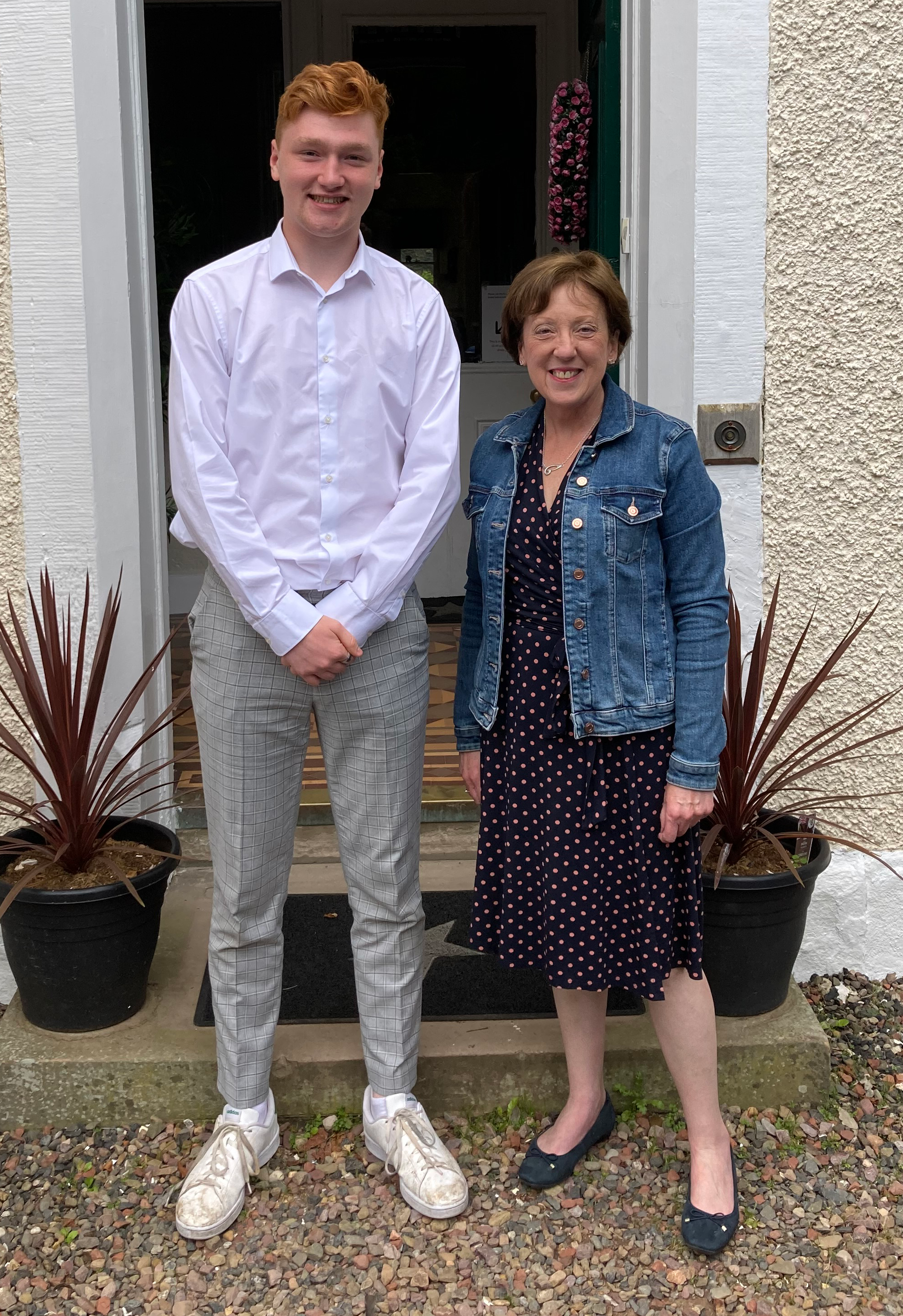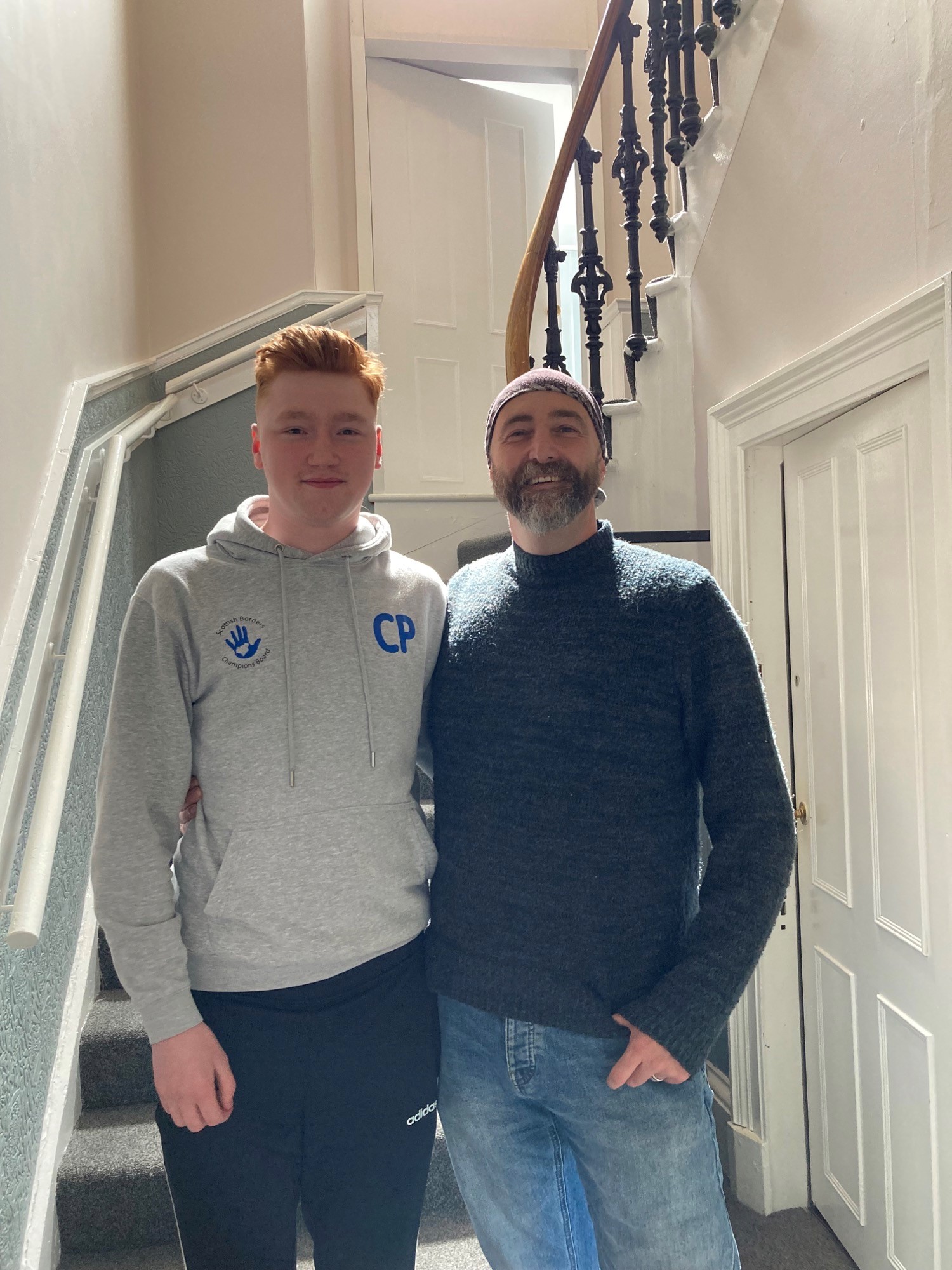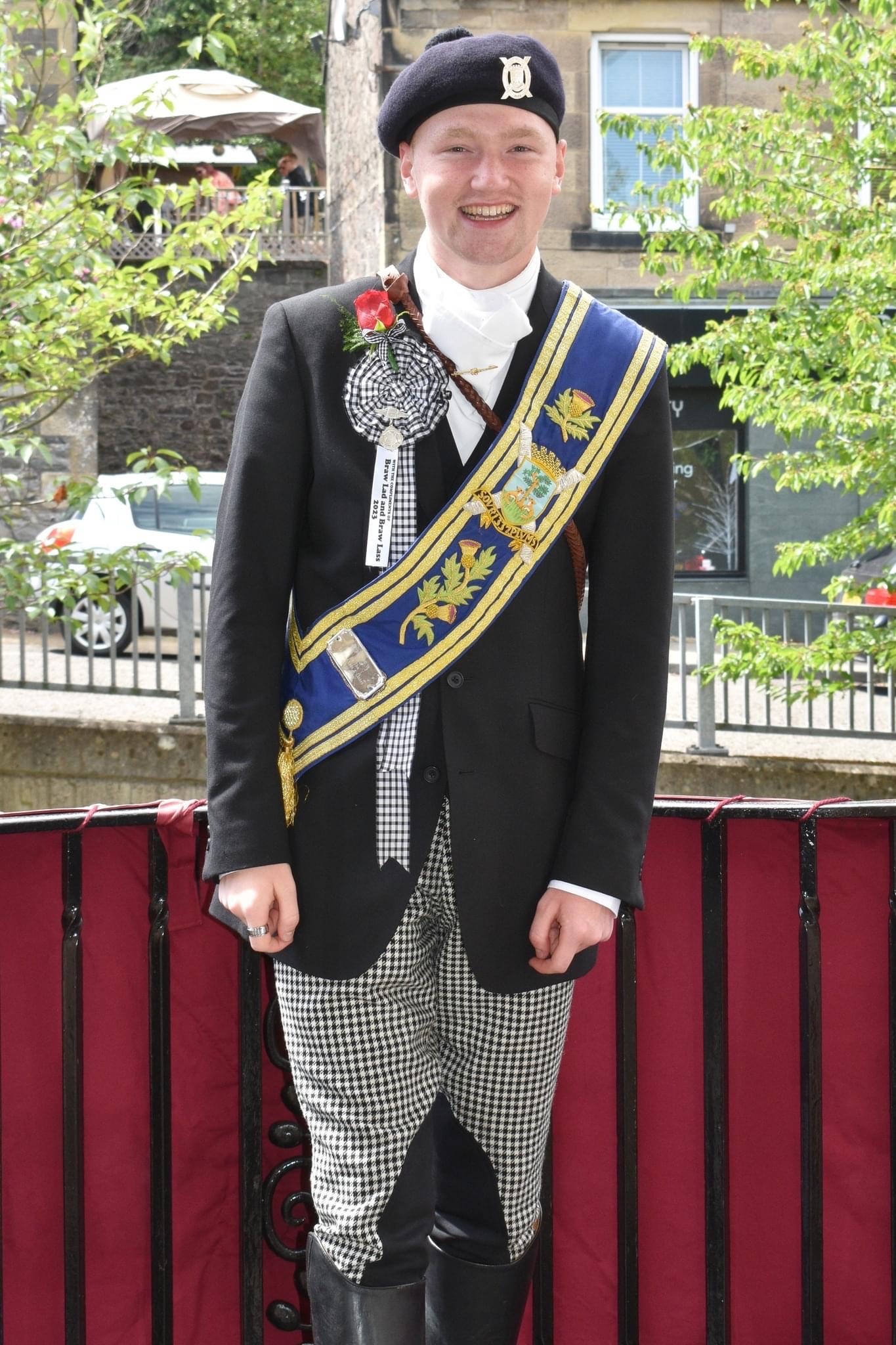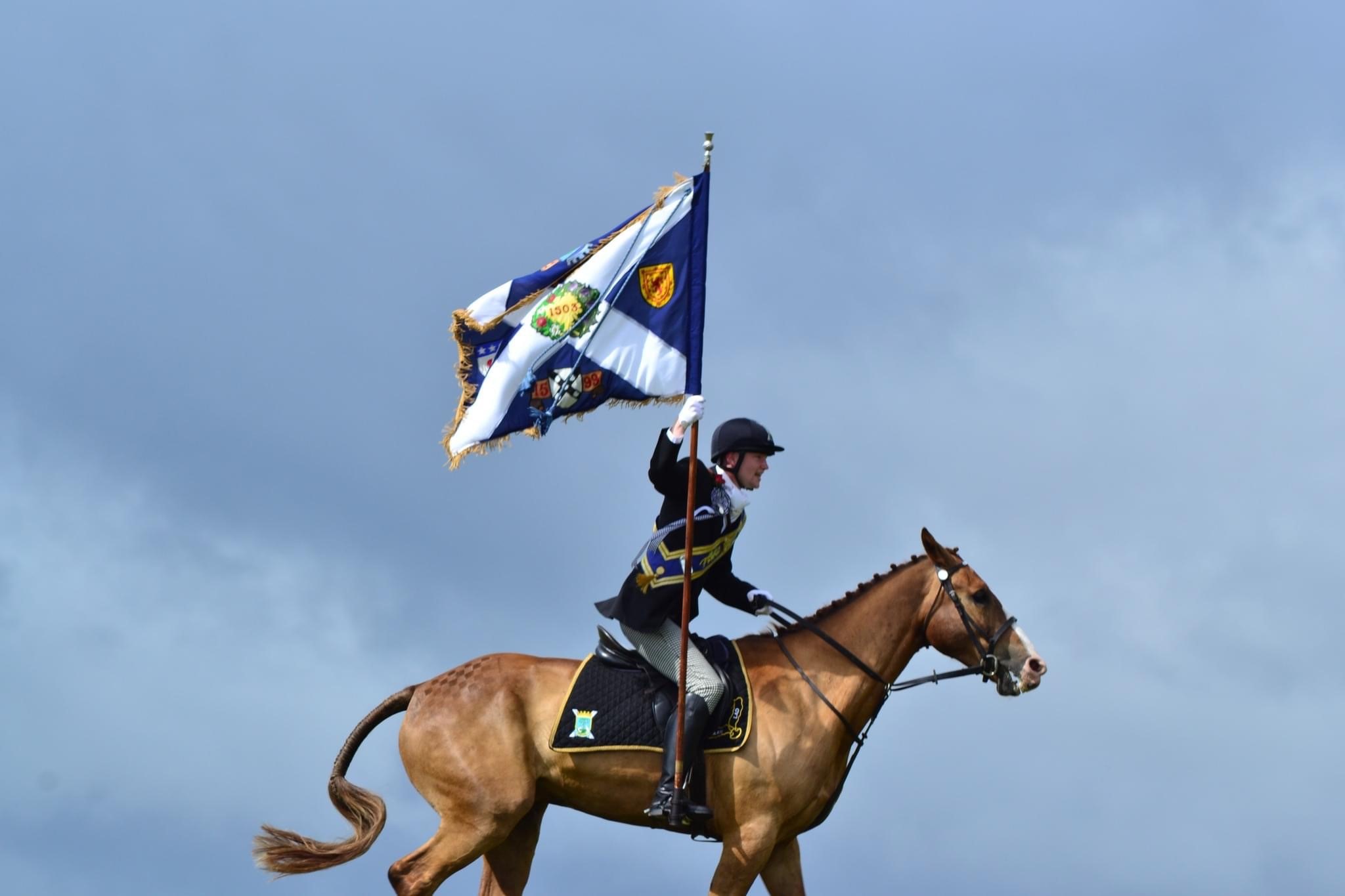Alison Jamieson, team manager in the children and young people’s team met with Cory Paterson, Scottish Borders Council Promise Lead for young people, to ask him about how his care experience and ongoing support from staff at Wheatlands children’s residential home. In the interview, Cory reflects on how genuine, authentic, meaningful relationships, that have continued beyond the time he lived in the house, have helped him with his career and supported him in achieving his personal goals. One of these goals was being picked as his town’s Braw Lad to lead the annual horse ride outs and festivities.
 The Care Inspectorate identified through inspection that a major strength for Wheatlands is the relationships staff develop with young people during and beyond the time they live there. Alison spoke with Andrew Parker, manager at Wheatlands, about how this is achieved in line with The Promise and good corporate parenting. Andrew said: “Wheatlands is a children’s residential home that involves the participation of all whom work and live here. We believe supporting, investing, having confidence in individual team members enhances skills sets and in turn encourages staff retention. Staff retention and enhancing individuals staff members skill sets is what we believe is key to establishing stability and building strong, long lasting reliable relationships with young people that will carry on into adult hood. Allowing individuals to enhance skills and promoting confidence to voice their ideas has enabled Wheatlands to find creative and innovative ways to sustain a loving and caring environment for young people who feel part of family, not a residential home”.
The Care Inspectorate identified through inspection that a major strength for Wheatlands is the relationships staff develop with young people during and beyond the time they live there. Alison spoke with Andrew Parker, manager at Wheatlands, about how this is achieved in line with The Promise and good corporate parenting. Andrew said: “Wheatlands is a children’s residential home that involves the participation of all whom work and live here. We believe supporting, investing, having confidence in individual team members enhances skills sets and in turn encourages staff retention. Staff retention and enhancing individuals staff members skill sets is what we believe is key to establishing stability and building strong, long lasting reliable relationships with young people that will carry on into adult hood. Allowing individuals to enhance skills and promoting confidence to voice their ideas has enabled Wheatlands to find creative and innovative ways to sustain a loving and caring environment for young people who feel part of family, not a residential home”.
Cory said: “I think being in care helped me build resilience. I learned that if you want something don’t take ‘no’ for an answer and go for it. In care, you go to so many meetings where people are saying ‘No, you can’t do that’. I wanted to change that for young people”.
“I definitely think people at Wheatlands helped me a lot. They listened when I had a bad day, helped me get things off my chest and helped me reset. My throughcare worker said I should go for the job because it really suited me. But I think my self-determination really helped, you get used to being your own support. Wheatlands and my throughcare and aftercare worker really helped but I think my helped myself through my self-motivation and self-belief.
Read Cory’s full interview below.
What was it from your care experience that helped you have the confidence to move on to take on your young apprenticeship and then a permanent post as Promise lead for young people?
I think being in care helped me build resilience. I learned that if you want something don’t take ‘no’ for an answer and go for it. In care, you go to so many meetings where people are saying ’No, you can’t do that’. I wanted to change that for young people.
When I left Wheatlands I went to uni to do a dance course, but then Covid hit and there wasn’t much we could do with dance during that time. Then the Modern Apprenticeship for The Promise came up with Scottish Borders Council and they were looking for care experienced young people for the role. I was applying for jobs but they kept turning me down because I didn’t have many qualifications. It was my transitions worker who gave me the heads up about the post.
You have got to be confident, and I have always been a confident person. When I have a setback from something I have been determined to go for it and it usually happens. The staff at Wheatlands have been very supportive. When I started at uni some people wanted me to stay at Wheatlands and travel each day, but I wanted to experience living in the city and all it had to offer. It was the best experience of my life living there and it taught me a lot. I have learnt so much from so many people – good things and things we should do differently. That has built my confidence.
Who were the key people who helped you to get started?
I definitely think people at Wheatlands helped me a lot. They listened when I had a bad day, helped me get things off my chest and helped me reset. My throughcare worker said I should go for the job because it really suited me. But I think my self-determination really helped, you get used to being your own support. Wheatlands and my throughcare and aftercare worker really helped but I think my helped myself through my self-motivation and self-belief.
Everyone’s experience is different. We are care experienced, but everyone’s experience can be different. Some people need someone to push them. I had so many social workers come and go, so many placements, so that was difficult. School supported me but I was also left to look out for myself. People were saying ’go to college’, ’do this’ but it was up to myself to decide. It is hard for young people in care who are told to move but for me I was clear it is my life and I am the expert in that.
The staff a Wheatlands build such good relationships. I didn’t see them for a while when I was at uni but when I came back there was an open door. It felt like coming home and as if I’d never been away. I can still come in, have a nap on the sofa, and come for Sunday lunch. When I got my own tenancy, they came round and painted and wallpapered, they have even done my laundry. They feel like family. I would not have got through the past four years without them.
 Why is The Promise important to you?
Why is The Promise important to you?
I love it! I think it is so important because it is trying to make a difference to young people’s lives. It is doing small things, as well as big things, to improve Scotland as a whole. The move to more prevention and early intervention is needed. The fact that so many young people were involved in drawing up The Promise is really important to me.
Departments are really stretched though and there is not enough capacity, so things can slip. Things we do on a day-to-day basis though can easily slot into the Promise and we need to make sure that when making decisions we are delivering our corporate parenting duties and responsibilities.
We are getting there with The Promise but there is a long way to go. There never will be an end point. In three years’ time what we do today might be redundant because the situations young people are facing are changing constantly. The Promise is good, but we need to get better at delivering it. We need to keep listening to young people and, importantly, make sure we understand what they are saying. Meaningful participation is what is needed. I am a member of the Champions Board and want to make sure that feedback from young people is not tokenistic, it is what you do with it that is important. I get frustrated about how long it can take to get things done. Systems can be slow. It is important to recognise everyone has an impact on a young person’s life, from the admin support that makes sure a payment is made quickly through to a strategic lead attending a governance meeting that will affect young people.
What kind of activities are you leading on in your new Promise role?
I am a member of the Champions Board as the lead for young people. I am involved in developing a shared approach to make sure there is a platform for care experienced young people. I am overseeing a pilot taking place in schools. Given the size of the Borders, young people gave feedback that travelling to Board meetings was difficult, so we have started running Champion Hubs in schools, us going to the young people.
We are also looking at starting an independent advocacy service. This was a recommendation from a Care Inspectorate inspection. I have been in touch with the Research Promise Design School to look at what an independent advocacy service would look like and the substance behind it that would successfully get it set up and running. We are trying to create an advocacy driven culture so that people in meetings understand what it means and it becomes embedded. It is important young people have someone independent to talk to and it is my hope that we can create this for young people.
I am also involved with New Roots, a group for asylum seeking young people. This aims to establish new links for young people in the community and give them an opportunity to find a place where they belong. A safe space for socialising and help understand their culture.
What other kinds of things do you in your role as Promise Lead?
I want to do so much. I would love to be First Minister one day, that is something that would really make a difference. I would do it differently, I would be more involved. Processes are so dated it takes so long to get things done, that’s why an advocacy service would be good. Processes need to change.
I still have a lot to learn but I am passionate about the work I do. I think if you are passionate about something it comes across. If you can help other people see it, it can open up opportunities for change. Then you can have an impact on so many people’s lives, and that’s exciting. I hope I can encourage other people to do the same.
Where do you hope we will be with The Promise by 2030?
I was speaking to the First Minister last month about reaching targets by 2030, it is achievable if we put it to the forefront of our minds. I would want to see that we had a difference to the lives of infants, young people and adults. Reflecting on what we did well, I would like to see a sense of hope and enthusiasm for the next steps. Maybe more young people will be staying at home and won’t need to enter the care system but if they do, they will be cared for, loved and listened to.
The impact of cost of living crisis was something people didn’t perceive and support is needed for families, it is not always the answer to bring children into care. I hope we will focus on early intervention and prevention, so we don’t have to intervene so often. Breakfast clubs for example, might be that ray of sunshine, a break in the storm for that family at home. We also need to have a better sense of community where we can go to our neighbours for help and where everyone is in this together.
I hope we will see children and young people having fewer placements. When they have five or six placement moves it is not just a new bed, it is a new group of people, sometimes a new social worker, a new school, you have to tell your story again, it’s like starting again. It can feel like everything is ripped from underneath you. You don’t know where to sit in the new place or what is happening around you. There is also a big sense of loss. Imagine the loss being like bereavement. It can feel like that when you don’t know if you will ever see the people who cared for you again. We need to reduce the number of moves.
Young people have unique, special, diverse needs and we need to upskill foster carers to meet these needs. You can’t support young people if you don’t know how to. Sometimes there is a delayed response to trauma. The effects can be seen further down the line; three, four or 10 years later once people have had time to process it, so we need to see support available to help. We need more mental health support for young people and shorter waiting time.
I would like to see language used in the care system changed because it can be really negative and stigmatising. The word ’respite‘ for example suggests that the carer needs a break because of the young person. Some young people might not like the use of ’foster placement‘, ’care home‘, ’carers‘. We need to tackle the stigma attached. I remember when I was applying for jobs when I lived at Wheatlands, someone told me I should use a different address because the employers would know I was in care. We need to change people’s perceptions of what care means. It doesn’t mean you are difficult, badly behaved, damaged – we need to change that perception.
Things can change quickly if we want them to. When I came to Wheatlands there was no internet because it was too difficult to get a signal, then Covid hit, and everything was online within no time. If we put the effort and emphasis on the Promise we can move on quickly.
You were picked by the town to be the Galashiels Braw Lad 2023. What has been your best moment as the Braw Lad?
There have been so many incredible moments it is so hard to pick one. But getting to meet the people of Galashiels, returning the Burgh standard (flag), talking to people about what it means was surreal. Riding horses at the ride outs and representing the town was an honour. I have made friends for life. People said I couldn’t do it, but I had always wanted to and the staff at Wheatlands have helped me do it.
I remember riding my horse on one of ride outs past the home and the staff were out on the pavement waving and cheering – I never thought I would be riding a horse past the house.
What do you like doing when you’re not working so hard and being the Braw Lad?
I suppose I’m just like any other 21-year-old. I spend time with friends, go to the pub. I like series’ on TV and play games with friends. I am very good at chess, I was the captain of the club at school, but I am better than my friends (laughs) but I play online too. I am also in the Gala opera, I still love dancing.


